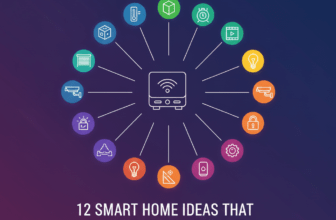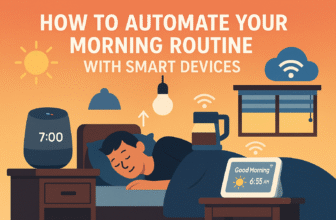
Understanding Smart Home Hubs: The Core of Your automated Universe
Smart home hubs are the central nervous system of any modern smart home setup. Acting as bridges between different devices, they enable seamless communication and interaction among various smart gadgets in your home. Whether it’s managing lighting, temperature, security systems, or entertainment options, choosing the right hub is critical to achieving an integrated smart home experience.
With numerous options available in the market, this buyer’s guide aims to provide you with a comprehensive framework for making an informed choice when selecting your first smart home hub. We’ll delve into essential features,compatibility issues,and practical use cases to elevate your understanding of smart home technology.
Core Features to Look for in a Smart Home Hub
Connectivity Options
The first aspect to consider when evaluating a smart home hub is its connectivity options. Different hubs offer various protocols for device communication, such as Zigbee, Z-Wave, Wi-Fi, and Bluetooth. A versatile hub should support multiple protocols to ensure compatibility with a wide range of devices.this adaptability allows users to mix and match products from various manufacturers,which is crucial for creating a tailored smart home setup.
Compatibility with Devices
Compatibility is paramount when selecting a smart home hub. Before making a purchase,it’s vital to check whether the hub supports the devices and brands you intend to use. Some hubs excel in integrating with specific brands or ecosystems, such as Google Assistant, Amazon Alexa, or Apple HomeKit. Understanding your current and future smart device needs can save you a considerable amount of time and money in the long run.
Integrations and Ecosystem Compatibility
Smart assistants
Most smart home hubs offer integration with voice assistants like Amazon’s Alexa, Google Assistant, or Apple’s Siri. These integrations not only enhance user interaction through voice commands but also allow for complex automation routines. A hub that can synergize with your preferred voice assistant makes your home smarter and easier to manage.
Third-party Applications
Many advanced smart home hubs support third-party applications, allowing users to create customized automation sequences or routines. Investigate whether the hub your considering has an API or supports app integrations that can help manage and control various aspects of your smart home effectively.
User Interface and Experience
Mobile Application
The quality of the hub’s mobile application can substantially affect your overall experience. An intuitive, user-kind application simplifies the setup process and daily operations. Look for apps that allow for remote control, easy device addition, and customizable dashboards to make managing your smart home as straightforward as possible.
Web Interface
Some hubs offer robust web interfaces that can be accessed from any computer. This feature can provide more extensive functionalities and ease of management for complex automations and settings adjustment. An effective hub should have a reliable web interface to complement its mobile app, making home management convenient and versatile.
Security Features and Updates
Data Protection
Data privacy and security are paramount in the connected world. Choose a smart home hub that employs robust encryption protocols to protect your information and data from unauthorized access. Regular software updates are also crucial; make sure the manufacturer commits to keeping their devices updated to address security vulnerabilities over time.
Access Controls
Access controls allow you to manage who can operate your smart home devices. some hubs offer multi-user support, which is an essential feature if you live with family or roommates. Look for hubs that provide detailed permission settings to ensure everyone has appropriate access to different devices.
Energy Consumption and Performance
Performance Metrics
Evaluate the performance metrics of your chosen hub, especially its processing power and response times. A fast hub responds to commands almost instantly, which is crucial for time-sensitive automations. Performance benchmarks can be found through reviews and tests in trusted tech publications.
Energy Efficiency
The energy consumption of smart devices can add up over time. A well-designed hub should not only be fast and reliable but also energy-efficient. considering a hub that optimizes power usage can help reduce your electricity bills over time while also contributing to environmentally friendly practices.
Price and Value Considerations
Investment in Infrastructure
Choosing a smart home hub is an investment in both infrastructure and experience. While it may be tempting to opt for budget models, it’s crucial to consider the long-term value. A more expensive hub often provides a robust feature set, ongoing support, and longevity, making it a wiser choice overall.
Cost of Accessories and devices
When budgeting for your smart home hub, also consider the additional costs associated with compatible devices and accessories. Some hubs may require specific brands or models of smart gadgets,while others are more open-ended. A thorough understanding of potential expenses will help you to avoid surprises later on.
Practical Implementation: Assessing user Needs
Identifying Core Requirements
Before committing to a specific hub, take the time to assess your home automation needs. Consider the types of devices already in your home or those you plan to acquire. Identifying your goals-whether it’s enhancing security, improving energy efficiency, or simplifying daily routines-will aid in selecting the right hub to meet your objectives.
Trial and error: Prototyping Your Smart Home
Don’t be afraid to experiment. Sometimes, the best way to find the right hub is through trial and error. Many manufacturers provide a return policy, allowing you to test different models. This prototyping phase can reveal insights on what features matter most to you and how different devices perform together.
Future-Proofing Your Smart home Hub
Scalability and Upgrade Options
As technology evolves, so will your smart home needs. A hub that allows for scalability ensures you can add more devices and functionalities over time. Look for hubs that offer upgrade paths or expanded service agreements, as they mitigate the likelihood of obsolescence over time.
Staying Ahead of Trends
The smart home industry is continuously changing, with new standards and technologies regularly emerging. Consider a hub compatible with upcoming technologies or initiatives, such as Matter, that promise to improve interoperability across devices.
Concluding Thoughts on Your Smart Home Journey
Investing in Your Home’s Intelligence
Ultimately, the choice of your first smart home hub will significantly impact your experience and the effectiveness of your home automation system. Taking into account the facets discussed in this guide will empower you to make a well-informed decision that not only meets your current needs but can also adapt as your home evolves. Embrace the journey into smart living and enjoy the convenience and efficiency that modern technology provides.






